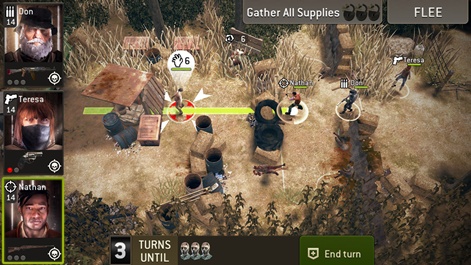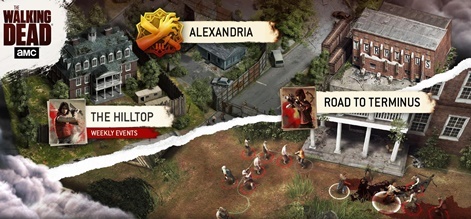It's often said in the world of free-to-play development that launching a game is the beginning, not the end.
These aren't boxed products released onto shop shelves, never to be worked on again. These are games-as-a-service that require constant operation and updating, often over a period of several years.
PocketGamer.biz has long been investigating the Making Of notable games soon after their launch, but what happens long after a game is released?
In an attempt to find out, this regular feature will talk to the developers behind maturing live games about their experience so far. You can read all previous entries here.
In this entry, we speak to Next Games CMO Saara Bergström about 2015 strategy game The Walking Dead: No Man's Land.
PocketGamer.biz: With The Walking Dead: No Man's Land now more than one and a half years old, how do you reflect on its performance - from launch to the mature title it is now?
Saara Bergström: We are so pleased with the game and the team who has has passionately worked on it all this time. We knew we set out to do a “gamer's game” with the turn-based mechanics and deep character progression and this conscious choice has served us well.
All of our key metrics have significantly improved since launch. Every game studio knows that improving any of them, be it retention, ARPDAU or DAU is hard work.

If you look at our 2016 numbers alone, we did have a significant increase of 75% in our global ARPDAU and doubled our D60 retention during 2016. Definitely cannot complain!
How big is the team currently handling live ops on No Man's Land?
We have a handful of people concentrating on feature development and tech, but the majority of the team works on content, operating the game’s events, community, marketing and analytics. From 10 to 25 people, depending a bit on what you count towards the live team.
How important do you consider customer support and updates to be? What has been your approach to this?
We focus on service-based games so it’s extremely important that the game is “alive” at all times.
If you look at our 2016 numbers alone, we did have a significant increase of 75% in our global ARPDAU.Saara Bergström
Part of the team concentrates on feature development, but we consider live operations equally, if not more important for The walking Dead: No Man’s Land.
We also have a fantastic community and support team who listen to the community very carefully and act as the voice of our players internally.
The community is so important to us that every Next Games employee from the CEO to coders and marketers go through an intensive hands-on training at our “Player Support Bootcamp”.
This is done in order to really get to know our players and understand how the community reflects on the decisions we make concerning the game. We feel that you get the best results when you combine that qualitative feedback from players with data and analysis on a macro level.
How have significant updates been responded to by players?
In 2016 we made multiple updates in The Walking Dead: No Man’s Land. The three big ones were the addition of PvP, the fan-favourite TV show cast members as playable characters and the story integration in between the TV show and the game for season seven.
All three were very well received and resonated with different kinds of audiences in our game. The cast and show integration clearly spoke to the fans of the TV show whereas the addition of PvP was an update that resonated well with the more core gamer audience.
We always try to live and breathe the TV show and the seasonal cycle in our updates and that’s worked very well for us.
How have you gone about ensuring that The Walking Dead: No Man's Land maintains a sizeable and active player base long after its launch?
It’s extremely important to recognise how the fans of the show are consuming the show-related content beyond the weekly episode, how they talk about it and to tap into that natural buzz-cycle. Then tailor the game features, content and live operations such as offers and weekly challenges around it.
The secret sauce there is that this is a joint effort with game developers, marketers, community folks and analysts.Saara Bergström
The secret sauce there is that this is a joint effort with game developers, marketers, community folks and analysts. You can’t leave anything out of that equation.
What benefits and challenges are offered by being affiliated with an ongoing TV series? How have you tweaked your strategy accordingly?
We’ve been live with the game since season six started in October 2015. Back then we started with a light story integration to the show. The players loved it so much that we decided to go all in for season seven premiere last year.
We of course knew from the start that the brand integration was vital for the success of the game. It needs to be an authentic experience. You can’t just fake it, slap on a brand, because the fans will see through that right away.
We decided to build a bespoke season seven experience in the game where players get to unlock content and participate in events related to the show every week throughout the season after each episode has aired on TV.
This was the first time a game and a TV show, or any entertainment IP for that matter, have been connected in almost real time.
Within that same “Season seven hub”, as we call it, we also offered sneak peeks and behind the scenes content for fans of the show to sit back and watch when they want to take a break from playing, but not having to leave the game.
So it was very much a tailored experience for The Walking Dead fans and it did resonate very well according to our store ratings and all the positive messages we got through to our Player Support and via social media.

The collaboration between us and the IP holder is very important and we pay a lot of attention in building the game together.
We are of course very delighted that we were able to deliver a spot on fans-first execution. This certainly was a lot of work from both us and our partners at AMC to be able to pull this off.
We had access to the show scripts and episodes beforehand and tailored content accordingly.
Any KPIs such as downloads, DAU or retention you’re willing to share?
The Walking Dead: No Man's Land has over 16 million downloads to date. During 2016 we doubled our global D60 retention and improved ARPDAU by 75%.
We are very excited to be working on two new licensed IP-based games.Saara Bergström
What lessons have you learned/are you still learning from No Man's Land? Is there anything about the game that, in hindsight, you'd now handle differently?
I guess there’s always a bump or two along the way here and there for any game project. We have a veteran team here at Next Games though so I feel like we’ve been very well prepared from day one.
Our players have definitely given us a lesson or two on communication. One of the hardest parts is to serve the community with the right amount of information, when at the same time you still want to keep things like upcoming exciting features as surprises.
But we’ve listened and learned. Our game team is very passionate about the game they’ve created and try to listen to the community very carefully, who are equally passionate about the game as well.
What's next for The Walking Dead: No Man's Land in 2017 and beyond?
With the service-based games model we operate on, you’re never ready. We have some very cool fan-focused content lined up for the summer and we are also working on season eight plans for next fall. So continuing to work on the game full steam ahead.
The Walking Dead: No Man’s Land is a great showcase for what the passionate Next Games team is capable of and we are very excited to be working on two new licensed IP-based games as well.





















